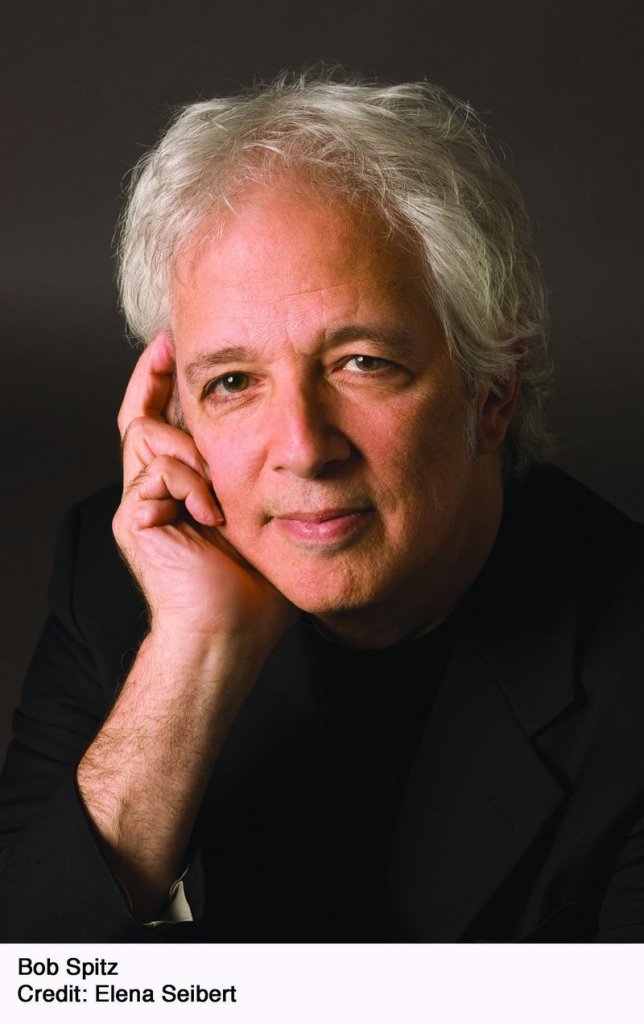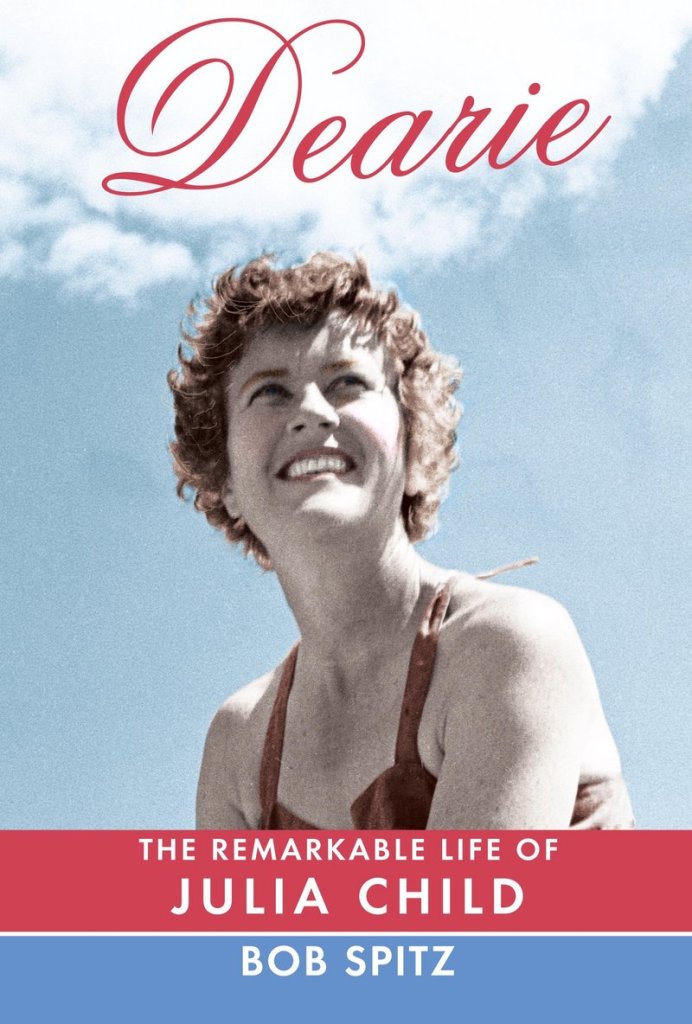Bob Spitz has had a career anyone would envy.
In the 1970s, he worked with Bruce Springsteen’s management company, then with Elton John. Eventually, he retired from the music business to become a writer.
The author of seven books, Spitz has explored sweeping topics such as The Beatles’ influence on American culture and the Woodstock Music Festival. His latest work examines the life and times of another all-American phenomenon, Julia Child.
Spitz spent a considerable amount of time with Child in Italy in 1992, when this book was just a vague notion, but he was smart enough to record his conversations with her. The result is “Dearie: The Remarkable Life of Julia Child” (Knopf, $29.95), which was published on Child’s 100th birthday and provides an intimate portrait of the woman who changed the way the country cooks.
Spitz, 51, was born and raised in Pennsylvania, but has spent that past 40 years in New York City, where he currently lives with his wife and daughter. He has two new projects in the works: A memoir written with rocker Graham Nash and a biography of Ronald Reagan.
Q: Were you a big fan of Julia Child before you met her in Sicily?
A: I was a huge fan of Julia’s. My mom was a terrible cook — sorry, mom — but every Monday night she would watch Julia Child, and every Tuesday the family would get a fabulous dinner. My mom really became a good cook because of Julia, and I became a big fan of Julia because of what she was doing to my mom. I’ve been a fan of hers since I was 13 years old.
Q: You traveled with Julia Child for a bit. How did that time with her inform your profile of her in the book? Did you get to ask her a lot of questions?
A: I was so fortunate to travel with Julia for almost a month and doing nothing but eating Italian food, which she didn’t care for, and talking about her life. She was 82, and it was a moment of great reflection for her, in which she could really put her life in perspective and what she had brought to the American table. And I was smart enough to run a tape recorder.
I have about 40 (to) 45 hours of Julia on tape, and that formed the basis of “Dearie.” And then, of course, I spent two years on the road up to my eyeballs in her archives and talking to everybody available who was close to her.
Q: Did hearing their stories and having that kind of access to her personal life change your view of her in any way?
A: It did, as a matter of fact. It allowed me to separate the view that most of us have of Julia as being a good cooking teacher but a comic personality into the real Julia Child, who was very serious about her role in American culture.
She took what she did very seriously, and knew what her responsibility was to her fans and to the general public who grew up cooking based on her show.
That was what really fascinated me about her — that serious side of her — also the serious side of her approach to cooking. She really felt that she wanted to be taken seriously as a cooking teacher, as an instructor, and there was no comedy involved in that whatsoever.
And by the way, contrary to popular opinion, she never dropped anything on the floor. She never spilled anything on TV. She was very careful. All of that is part of the Julia Child myth.
Q: What about burning dishes?
A: Occasionally. She made a number of mistakes on the air, and what Julia loved about making mistakes — and sometimes I think she made them on purpose — was to show the viewer how to rescue a dish that had tumbled into chaos.
Q: She kind of gives everyone hope too, because if I recall correctly, she wasn’t exactly a stellar cook when she first started out.
A: That’s true. When she first started out, Julia was 40 years old and couldn’t so much as boil water, which I found fascinating about her. She was given hope by her cooking instructor, and she just plugged away at it, and she wanted other people to do the same thing. She definitely wanted people to use her as a role model, in that no matter what age you are, you could do it too.
Julia had a motto, and it was “never apologize,” and she meant it. She had put several really crappy meals on the table to guests in the early stages of her cooking career, and she knew what she had made was horrible, but she said you just put it right on the table, you look at them and you smile at them while they’re eating. Everybody’s going to appreciate what you did for them, no matter how it tastes. Don’t apologize.
Q: I’ll bet there’s a lot you wish you could go back and ask her now.
A: I got a really intimate portrait of Julia, not just from what she told me but from her letters, which were voluminous. She and Paul, her husband, left 127 boxes of archives, and in those archives are really every expression of her life, fleshed out in both great and intimate detail.
I think there were very few parts of Julia’s life left to explore. She really put her life right out there for the public, and in fact those archives are open to the public too. I think I got a fairly accurate portrait of who she is. I’d like to ask her about a few recipes –what I did wrong — but that’s it.
Q: Food has become so political in the past few years. A lot of people are turning away from processed foods, questioning agribusiness and turning up their noses at ingredients like high-fructose corn syrup. Do you think if she were alive today, Julia would be out there swinging on these issues?
A: I can tell you this: Julia often came down on the wrong side of those issues. She very early thought organic food was preposterous. She thought that organic food was leached of flavor. She felt that vegetarian cooking was horrible, and she thought there was nothing wrong with genetic engineering of foods. So Julia wasn’t always on the right side of these issues.
People always accused her of having too much fat in the food — too much butter, too much cream. Julia always felt that it was unwise to sacrifice taste in any respect. Instead, you should eat in moderation. She did that her entire life She never compromised taste in anything.
That said, I think Julia would be a loud advocate against obesity, and she always advocated for fresh ingredients, local vegetables, only the highest quality ingredients in everything. You would not have caught Julia Child with a 48-ounce soda. And she frowned upon not fast food but packaged food that was full of fake ingredients. She didn’t use pre-packaged food.
Q: As an author, what is it that you like about writing biographies? Is a biography easier or harder than other genres?
A: Oh, it’s wonderful. I get to immerse myself in the life of a fascinating person for four, sometimes nine years with The Beatles. You start to walk in their clothing. You start to understand who they are and how they changed the world.
That said, you go into a room by yourself often when someone is president of the United States and come out of that room when a different person’s president. So it’s reclusive, but I love it.
And I look for two things when I decide on a subject. One is that a person is beloved in some way, and No. 2 is that they have changed the culture. That’s one of the most important things for me: Writing about how our culture has shifted over the years and the people who contributed the most to it.
I’ve been very lucky. I love what I do. I hope I can do it for the rest of my life. I’ve got some good projects coming up.
Staff Writer Meredith Goad can be contacted at 791-6332 or at:
mgoad@pressherald.com
Send questions/comments to the editors.





Success. Please wait for the page to reload. If the page does not reload within 5 seconds, please refresh the page.
Enter your email and password to access comments.
Hi, to comment on stories you must . This profile is in addition to your subscription and website login.
Already have a commenting profile? .
Invalid username/password.
Please check your email to confirm and complete your registration.
Only subscribers are eligible to post comments. Please subscribe or login first for digital access. Here’s why.
Use the form below to reset your password. When you've submitted your account email, we will send an email with a reset code.